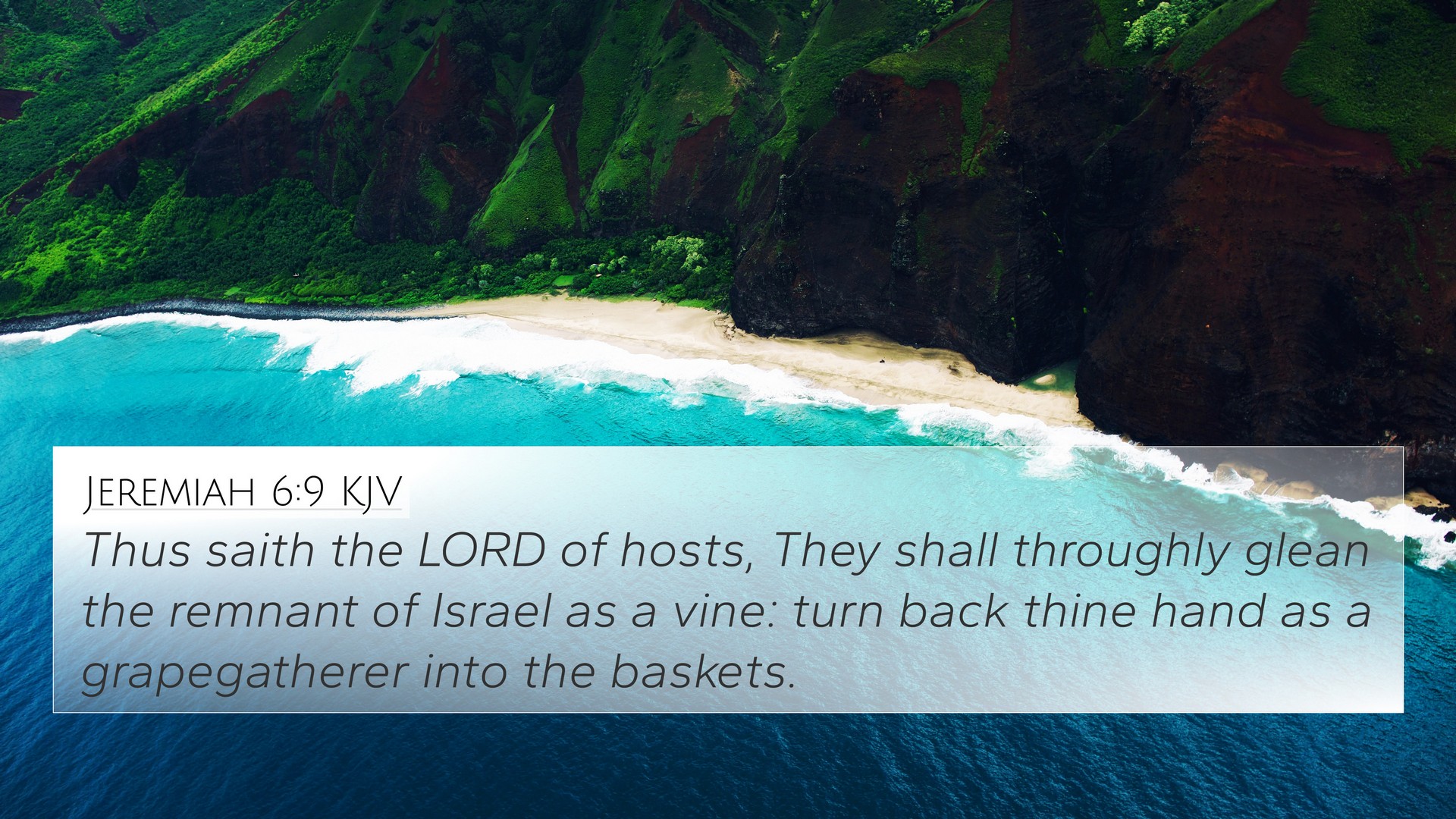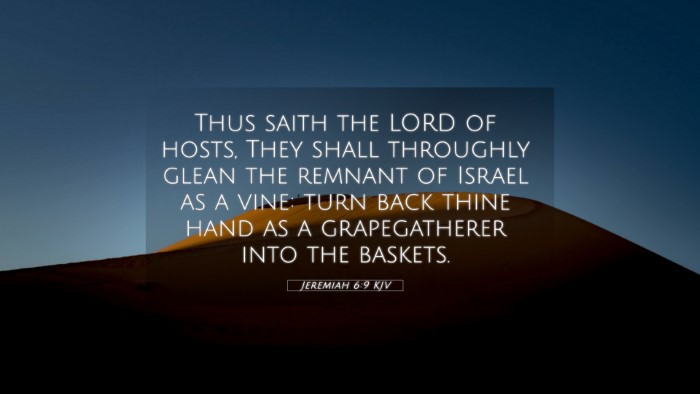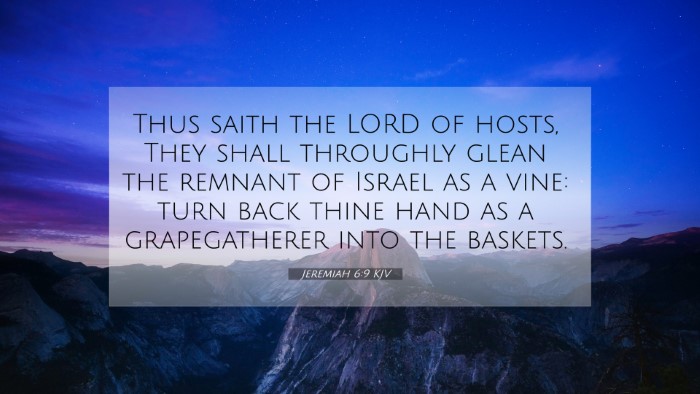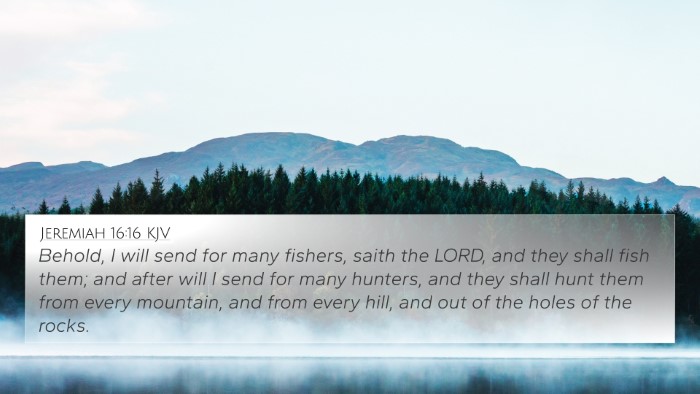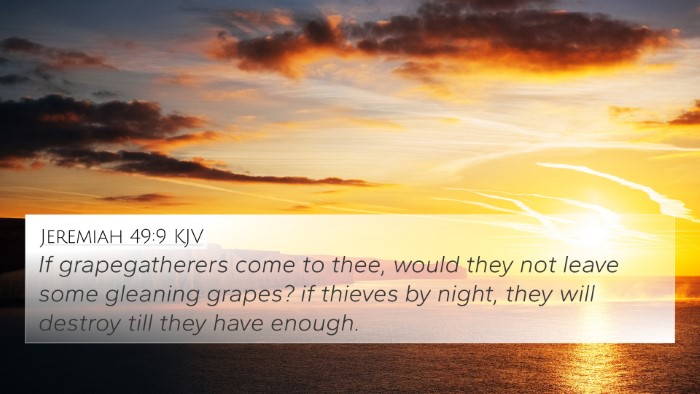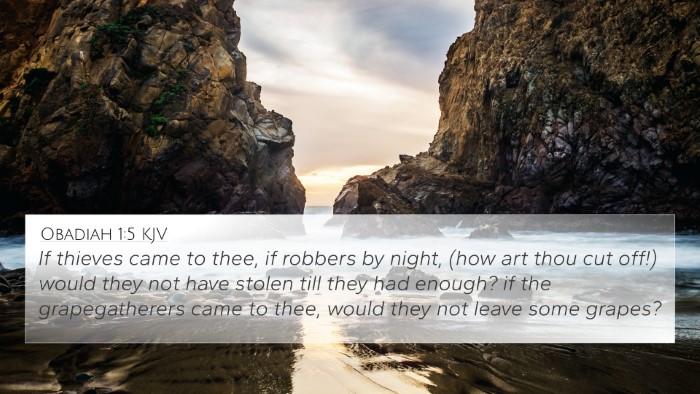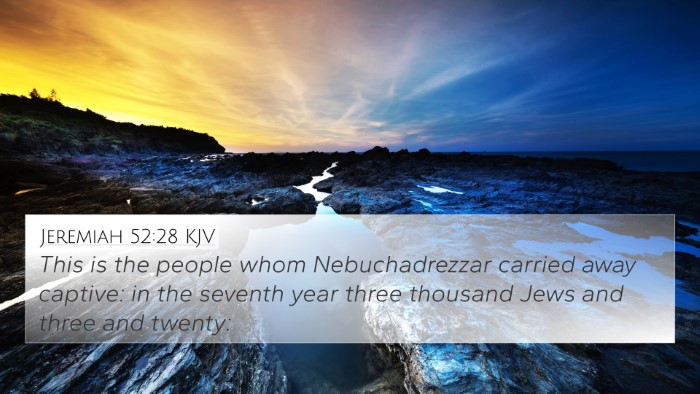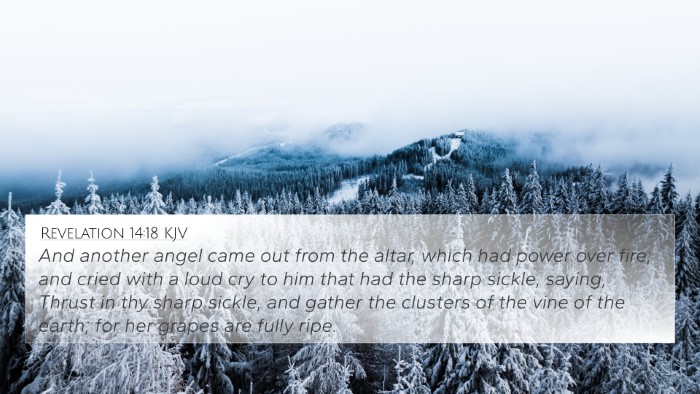Understanding Jeremiah 6:9
Verse: “Thus saith the Lord of hosts, They shall thoroughly glean the remnant of Israel as a vine: turn back thine hand as a grape gatherer into the baskets.” - Jeremiah 6:9
Summary and Interpretation
The verse Jeremiah 6:9 presents a vivid imagery related to the prophetic admonition of God through Jeremiah to the people of Israel. The Lord conveys a warning concerning the impending judgment and the need to heed the call for repentance. This commentary consolidates insights from historical biblical scholars, including Matthew Henry, Albert Barnes, and Adam Clarke.
Historical Context
The prophetic book of Jeremiah was written in a time of great turmoil for Israel, as they faced the Babylonians’ impending invasion. Israel is being warned about its moral decay and the consequences of their actions. The “gleaning” metaphor underscores that even in judgment, there will be a remnant saved.
Insights from Commentaries
- Matthew Henry: He emphasizes the symbolism of the vine and the gleaning process, indicating that God identifies and preserves the faithful among the unfaithful. Henry suggests that while destruction is imminent, God’s grace allows for a remnant to return to Him.
- Albert Barnes: Barnes expands on the gathering metaphor, proposing that the “remnant of Israel” signifies those who remain faithful to God’s covenant amidst widespread apostasy. He highlights the divine nature of the gathering, exemplifying God’s control over Israel's judgment.
- Adam Clarke: Clarke articulates that the phrase “turn back thine hand” implies the mercy of God, where although there is punishment, there is also hope and restoration for those who turn back to Him. He stresses the action of collecting as a sign of hope for restoration.
Theological Implications
This verse challenges readers to reflect on the themes of judgment and mercy. It illustrates a God who, despite the unfaithfulness of His people, remains committed to redeeming those who sincerely seek Him. The gathering of grapes serves as a reminder of God's nurturing aspect, as He collects His people even after judgment has occurred.
Connections to Other Bible Verses
Jeremiah 6:9 has several noteworthy cross-references that enrich its understanding:
- Isaiah 24:13: “When thus it shall be in the midst of the land among the people, there shall be as the shaking of an olive tree, and as the gleaning grapes when the vintage is done.” - This verse also speaks of remnant gathering amidst calamity.
- Romans 11:5-6: “Even so then at this present time also there is a remnant according to the election of grace.” - This shows the continuity of the theme of a faithful remnant in the New Testament context.
- Micah 7:1: “Woe is me! For I am as when they have gathered the summer fruits, as the grape gleanings of the vintage: there is no cluster to eat.” - A parallel illustration of judgment and the remnant imagery.
- Lamentations 3:22-23: “It is of the Lord's mercies that we are not consumed, because his compassions fail not. They are new every morning: great is thy faithfulness.” - Highlights the mercy aspect amidst judgment.
- Matthew 3:12: “Whose fan is in his hand, and he will thoroughly purge his floor, and gather his wheat into the garner; but he will burn up the chaff with unquenchable fire.” - Echoes the theme of gathering the faithful versus judgment on the unfaithful.
- Ezekiel 34:12: “As a shepherd seeketh out his flock in the day that he is among his sheep that are scattered; so will I seek out my sheep, and will deliver them out of all places where they have been scattered in the cloudy and dark day.” - Demonstrates God’s pursuit of His people.
- 1 Peter 2:9: “But ye are a chosen generation, a royal priesthood, an holy nation, a peculiar people; that ye should shew forth the praises of him who hath called you out of darkness into his marvelous light.” - A New Testament connection to the chosen remnant.
- Hebrews 12:1: “Wherefore seeing we also are compassed about with so great a cloud of witnesses, let us lay aside every weight, and the sin which doth so easily beset us, and let us run with patience the race that is set before us.” - A call to perseverance akin to the remnant's call.
- Revelation 3:5: “He that overcometh, the same shall be clothed in white raiment; and I will not blot out his name out of the book of life, but I will confess his name before my Father, and before his angels.” - The assurance of salvation for the faithful remnant.
Application for Today
Understanding Jeremiah 6:9 encourages believers to cultivate faithfulness amidst the challenges of contemporary life. The imagery of gleaning serves as a reminder that even when circumstances appear dire, God has the capacity to save and restore His people. Believers are called to align their lives to God's instructions and to seek the remnant’s path of faithfulness.
Conclusion
In conclusion, Jeremiah 6:9 serves as a powerful reminder of God's ceaseless dedication to His people, even amidst judgment. The combination of judgment and hope encapsulated in this verse reveals the dual nature of God's dealings with humanity, providing a context for deeper theological reflection and practical application. Through cross-referencing other biblical texts, readers gain a more profound understanding of the continuity of God's plan throughout the Scriptures.
Further Study Recommendations
For those seeking to explore deeper into the connections among biblical texts, utilizing bible concordances and bible cross-reference guides can enhance the study of scripture. Engaging in cross-reference bible study methodologies will also illuminate connections between parallel themes and the rich tapestry of divine revelation throughout the Bible.
